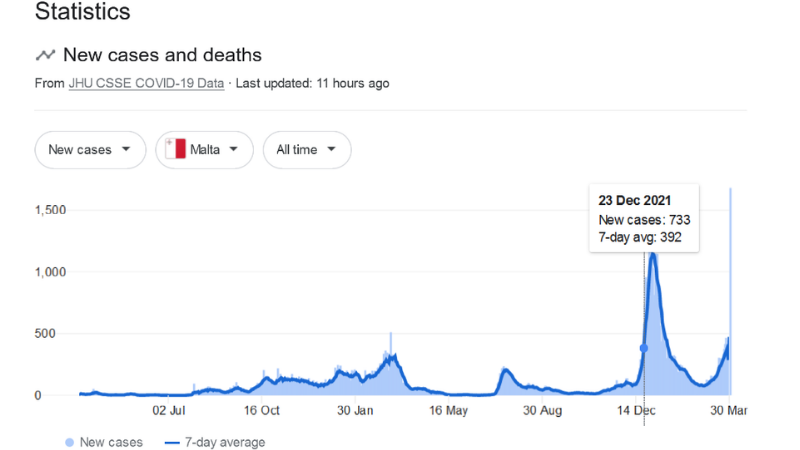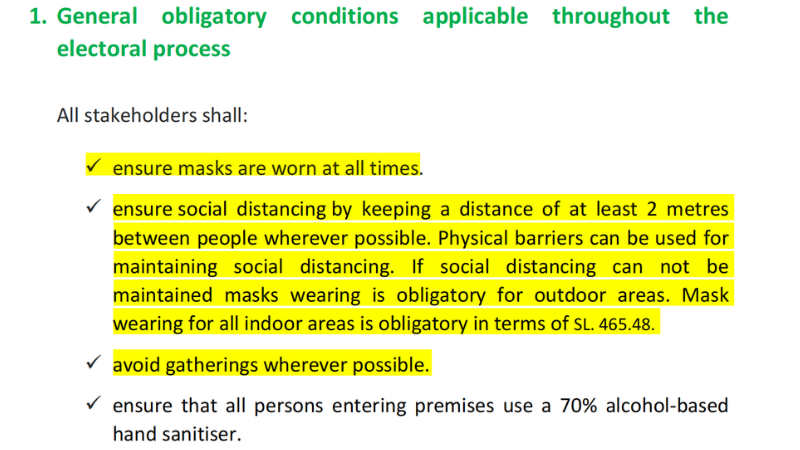Health Minister Chris Fearne yesterday announced that he’d tested positive for COVID-19, barely two days before Pope Francis arrives in Malta and just after being photographed, maskless, with the entire new Cabinet and the President of Malta, after the swearing-in ceremony at the Palace in Valletta.
His announcement came as infection numbers climb rapidly, hospital and ICU admissions multiply and reported deaths rise steadily. It also came just after Prime Minister Robert Abela’s pledge to continue lifting COVID-related restrictions.
While many have expressed concern about whether the entire Cabinet and the president should now be in quarantine, especially in connection with the 86-year old Pope’s visit, it’s becoming clear that the pandemic is nowhere near over.
The six-week electoral campaign, which saw mass rallies with attendees crowded together, most not even wearing masks, may have exacerbated the transmission rates significantly, and easing quarantine rules in the face of a virus that appears to become more contagious with every evolution, is clearly helping the disease spread further.
Prematurely relaxing the rules designed to limit infection rates and protect the population might be the popular choice for those tired of being hemmed in by restrictions, but is it the right one?
Malta isn’t alone in seeing infection rates rise, nor in experiencing pandemic fatigue and the push for restriction removal. It’s happening across the world.
On 30 March, the director of one of London’s foremost university research units wrote a column in The Guardian outlining her concerns over “the three big myths of the Omicron age”, referring to the growing surge in cases of Omicron variants of COVID-19 in the UK.
“The pandemic has changed, but the idea that it is over is false. Omicron represents a major variant, taking over in the UK in a similar way to Delta last summer and Alpha last winter,” director of UCL’s clinical operations and research unit Christina Pagel wrote, referring to the biggest surge in UK cases since January.
According to Pagel, whose unit has been occupied with constant research into the various mutations of COVID strains since the pandemic brought the world to its knees two years ago, the three big myths consist of the belief that COVID-19 is now “endemic”, that the virus is evolving to become milder, and that the drive for vaccination is now largely over.
While many seem to believe that COVID is now an endemic virus we must adapt to living with, the director of UCL’s healthcare research team argued that humanity’s collective knowledge about how coronaviruses evolve long term is too limited to predict how much time it will take for the virus to become less deadly or at least predictable enough to control and suppress.
“New variants of COVID have risen rapidly over the past two years. Each variant of concern has spawned several offshoots – like our current BA.2 wave – but most game changing new waves we’ve seen have come from variants that have evolved completely independently from each other,” Pagel continued.
“Omicron did not evolve from Delta and Delta did not evolve from Alpha, Beta or Gamma. There has been no progression through successive variants, and no building towards ‘mildness’,” she added.
BA.2, the technical term for the second Omicron strain which has become the dominant form of the virus being detected in surges across the world, accounts for 86% of all cases in Malta, according to the superintendent of public health, Charmaine Gauci. While the strain is believed to be less deadly than its predecessors, the rapid mutations we’ve seen so far are nonetheless cause for concern, Pagel argues.
Pagel’s warnings contrast heavily with both the way the pandemic has been handled over the last three months in Malta as well as with the relatively optimistic tone of declarations made by Maltese authorities.
On 31 March, Malta registered another 760 new COVID cases, escalating the number of presently active cases to 5,540. The last time similar numbers were registered during a surge was in December of last year – on 23 December 2021 – 733 new active cases were recorded, right before the largest spike in local cases since the pandemic began.

While the drive for vaccination in Malta has been one of the most successful in Europe, experts like Pagel warn that the increased likelihood of newer, potentially deadlier strains from high rates of transmission means emergent strains may be resistant to currently available vaccines.
The electoral party rallies held by Labour Party and the Nationalist Party, which were supposedly bound by obligatory COVID standards for safety measures, saw large crowds of people with little to no social distancing in most cases.
These safety standards, drafted by the Electoral Commission and the Superintendent of Public Health, specifically urged all stakeholders to “avoid gatherings wherever possible”, earning both parties widespread condemnation from concerned citizens as well as entertainment industry players still grappling with restrictions on mass events.

An excerpt from the COVID-19 standards for safety measures for the electoral process.
Two weeks into the electoral campaign, Malta Today had reported how the daily average number of new cases from 20 February to 6 March stood at 87.4, while the rolling average from 7 – 19 March almost doubled to 185.8.













Mela u charmaine ghalqet halqa waqt il kampanja ma tmurx taqla li daqqa u tikecca u issa qeghdin inbatu il konsegwenzi tar rebha tal PL u tat kaxkira tal PN. CAPCAP POPLU GAHAN MEQ MEQ
Having been in the U.K. for the past month, I tend to think Malta’s approach to covid is far too draconian given the high level of vaccinated people and the mildness of Onicron, albeit more infectious. Here, life has returned to normal, it is no longer a legal requirement to self isolate and everyone is now getting covid and building natural immunity.
The most vulnerable are being offered a 4th booster and the rest of society which is not in danger gets on with their lives. This is how it should be unless a new variant of concern comes along.